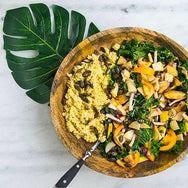
Did you know that 70 million cups of coffee are consumed every day in the UK alone? And, if you are one of them, you have been consuming the most widely used nootropic in the world - caffeine.
Nootropics are defined as natural or synthetic substances that have a positive impact on mental performance, often referred to as cognitive enhancers or smart drugs.
Caffeine is a very effective stimulant, and therefore a great cognitive enhancer as it boosts mental energy almost instantly.
HOW CAFFEINE AFFECTS THE BODY
So how does caffeine actually work in the body and importantly in the brain?
When we’re awake - moving, thinking and browsing on social media we release something called adenosine. Adenosine is one of your body’s best known sleep regulating molecules, and it binds to receptors in the brain, specifically the A1 receptor, and this causes your muscles to relax and you start to feel sleepy.
Enter caffeine, which blocks the adenosine locking with the A1 receptors, so you don’t get tired. And, the adenosine instead binds with a receptor called A2A which releases mood-enhancing neurotransmitters such as dopamine. This equals energy. And in a world where we’re busier than ever, this is a great tool.
In fact, coffee and tea consumption has fundamentally shaped the modern world. As humans switched from consuming alcoholic drinks to avoid falling ill from contaminated water, which left most of the workforce continually buzzed and lethargic - to drinking safe boiled tea and coffee, with highly stimulating caffeine. Safe to say we may not be where we are today without the stuff. (For more on this, listen to Michal Pollan’s new audiobook Caffeine.)

SO, IS COFFEE BAD FOR YOU?
Coffee itself is not bad for you, quite the opposite, it has actually been noted that coffee is the primary source for antioxidants in the American diet. This is great, however it does reveal some other worrying aspects of what American diets are actually missing. If coffee is the healthiest thing that humans are consuming daily, it shows a significant lack of fruits and vegetables that should make up the main source of polyphenols.
Too many coffees and therefore too much caffeine has been shown to increase blood pressure that can lead to heart disease, which is the leading cause of death worldwide. Too much caffeine can also be detrimental to sleep, which then becomes an issue to health.
HEALTHY COFFEE ALTERNATIVES
Looking beyond coffee, there are many more foods and compounds that have a beneficial effect on the brain and cognition.
New and ongoing research in different types of plants, berries, funghi and roots is uncovering many properties that can improve various aspects of the how we think and perform in real time, as well as offering long term, protective benefits.

INTRODUCING INDI MIND
Mind, by Indi, combines some of nature's best-researched natural nootropics, as well as some caffeine from Guarana, to optimise both brain function in real time, as well as provide protective benefits for long term brain health.
Hero ingredients in INDI Mind that you should know about:
- Bacopa Monierri: is one such plant that has excited scientists, showing an ability to stimulate the branches of nerve cells - the dendrites - to grow and improve how test subjects process information after supplementation.
- Lion’s Mane mushroom: is also generating interest showing a promising ability to promote neurogenesis, the development of new nerve cells. Scientists think this ability could offer benefits in treating neurodegenerative decline seen in Dementia and Althzheimers patients. As life expectancy has extended over the past century, and continues to improve worldwide, discovering foods and compounds to prevent and treat dementia is one of the most important frontiers in modern science.
The term "adaptogen" is often closely tied to nootropics, as these foods/compounds show an impressive ability to help the body cope with stress. Rhodiola Rosea, which is in Indi Mind has been found to reduce cortisol levels and restore the balance of hormones to help test subjects perform under pressure and think clearly.
There are even foods we can find in any supermarket that offer powerful brain boosting capabilities. Beetroot is rich in dietary nitrates that are vasodilatory, meaning it opens up blood vessels, improving blood flow and oxygen to the brain.

THE VERDICT
The next time you find yourself on the way back to your local coffee shop for another macchiato to help get you through your afternoon meetings, try something different. Particularly, when you don’t want to be consuming lots of caffeine late in the day, go for some other brain boosting foods and feel the difference.






























































